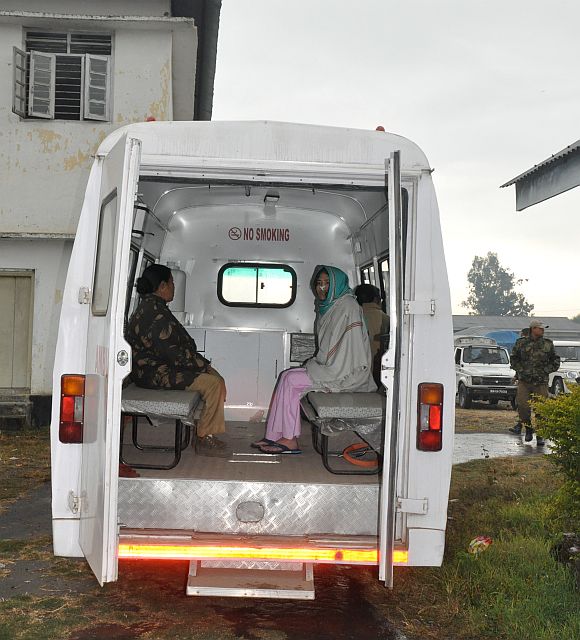Irom Sharmila's decision to end her 16-year-old fast against AFSPA continues to be hotly debated and contested in Manipur.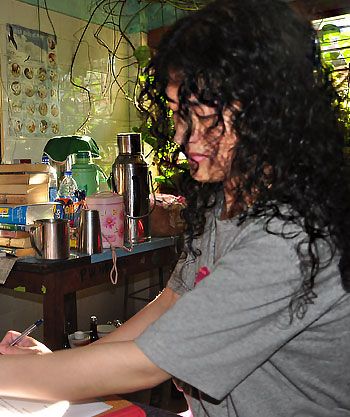
Chitra Ahanthem reports from Imphal for Rediff.com
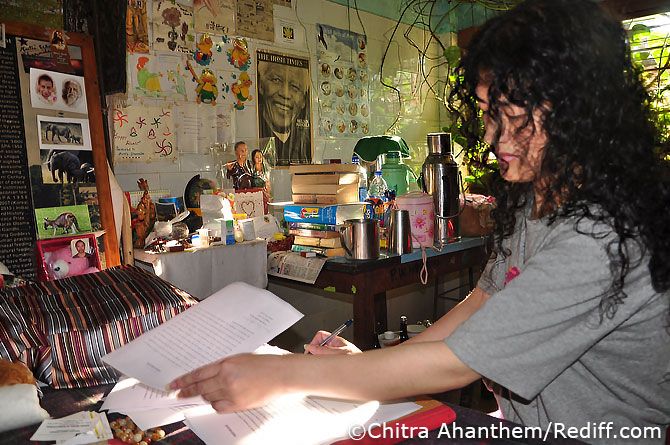
Has Irom Sharmila been rejected by the people of Manipur, as was projected by the media on August 9 when she broke her 16-year-old fast against the imposition of the Armed Forces Special Powers Act?
In terms of the socio-political scenario, Manipur is much like any other part of the country where liberals prefer to stay silent in the face of the organised vehemence of a few people.
Many will be quick to point out that she had no one to offer her the first drop of liquid to end her fast, that there was no voice of support, that she was turned down by the residents of an area that she had gone to reside in.
They will point out that not many people are talking kindly of Sharmila in public.
The interactions on social media have had its fair share of many who are sticking their necks out and calling out to the abusers who have spouted online vitriol against Sharmila's recent stand.
At a special ward in the Jawaharlal Nehru Institute of Medical Sciences Hospital in Imphal where Sharmila continues to resides, a steady stream of visitors who come individually or representing organisations slowly arrive every day even though visiting time is still being restricted.
Elsewhere in Imphal, groups of people conduct offline meetings and interactions on how best to be a support system for Sharmila while in the online world, there is now an active discussion on the nature of the public response towards her.
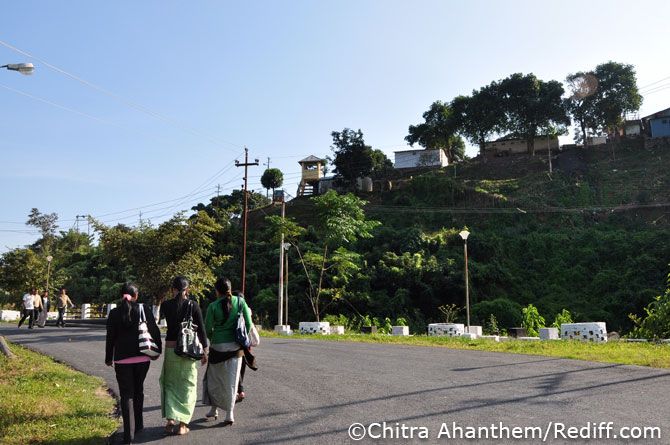
Sharmila's decision continues to be hotly debated and contested in informal groups at Manipur University, which may arguably be the only varsity to have an army camp on its campus.
"Manipur has a history where the impulsive or emotional action of a few people are often portrayed as the only response to a particular issue while the rational or logical aspect rarely comes out," says a student who did not wish to be named. "It is wrong to say that the response of certain women groups to Sharmila's decision to end her fast, take up politics and look at a future with a non local is the only response."
"She has every right to end her fast and be with the man of her choice," says Reena Kshetrimayum, who is pursuing a master's in political science. "I support her change in strategy of deciding to contest elections, but would prefer that she contests a Parliament seat and not for MLA. She will be a voice to reckon with in Parliament."
At Malom, where Sharmila first started her lonely fast following the incident in which 10 civilians were killed 16 years ago, Sinam Ongbi Chandragini, 64 -- who lost two of her sons and her elder sister in the firing -- says: "I, as a mother who has lost two of her sons in the Malom firing, cannot keep off food for more than 16 years. What she has done is unique and it is her decision to decide how to continue her resolve of the fight against AFSPA."
In a related development, Arambam Robita, who runs an NGO working for women's rights in Imphal, announced that she would take over from where Sharmila left off by taking on a fast, but was dissuaded by various civil society groups.
Robita, nevertheless, undertook her fast and when disrupted by groups on the ground that her two small children would suffer due to her decision, left Imphal to continue her fast in Ukhrul.
Robita's NGO colleagues have now taken her back to Imphal from where angry family members have taken her home. It is still unclear if the fast is on or not.
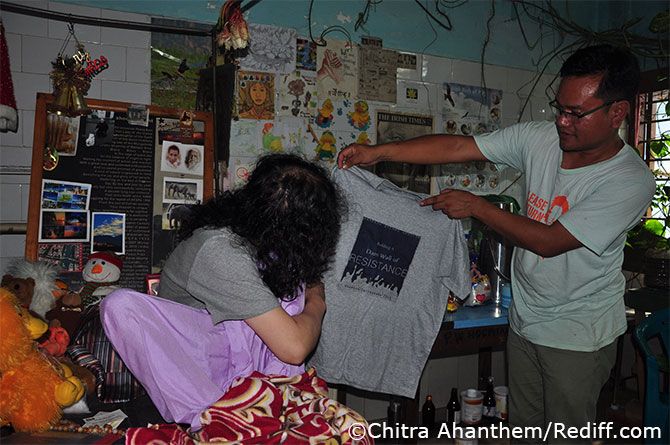
In her first media statement, Sharmila said: 'In continuation of my fight against the imposition of AFSPA in Manipur and following the change of my strategy by breaking my fast and instead taking up politics, I am now looking forward to a journey of understanding, justice, peace and love. I will henceforth be connecting with people in Manipur and elsewhere, cutting across the barriers of region, community, religion to work towards the repeal of AFSPA once my health permits me and after my trial proceedings on August 23.'
'I have received gracious invitations from the Manipur chapter of the International Red Cross Society, the Naga People's Movement for Human Rights in Ukhrul as well as a children's home in Senapati and am hopeful that there will be others as well in the future. I would also like to express my gratitude to all the organisations and individuals who have been visiting me at JNIMS to express their solidarity, love and concern, all of which are helping me to strengthen my resolve and inspire me towards our common goal of the fight against AFSPA,' she added.
In other words, Sharmila has clearly stated that her campaign against the draconian AFSPA will not take a back seat.
She also received a letter of support in her struggle to repeal AFSPA from the Narmada Bachao Andolan.
Signed by Medha Patkar, the letter invited Sharmila to Rajghat in Madhya Pradesh's Badwani to the Narmada satyagraha.
The invitations from Manipur's hill districts and the recent rallies there protesting the imposition of AFSPA are deeply significant given that the earliest victims of the Act was in these areas.
Days earlier, the former senior health department official at whose home Sharmila had planned to take shelter once the procedure for her release was completed, met her to say that there were now voices emerging in his locality who were beginning to support her. It was this same locality where women residents had turned her away on August 9.
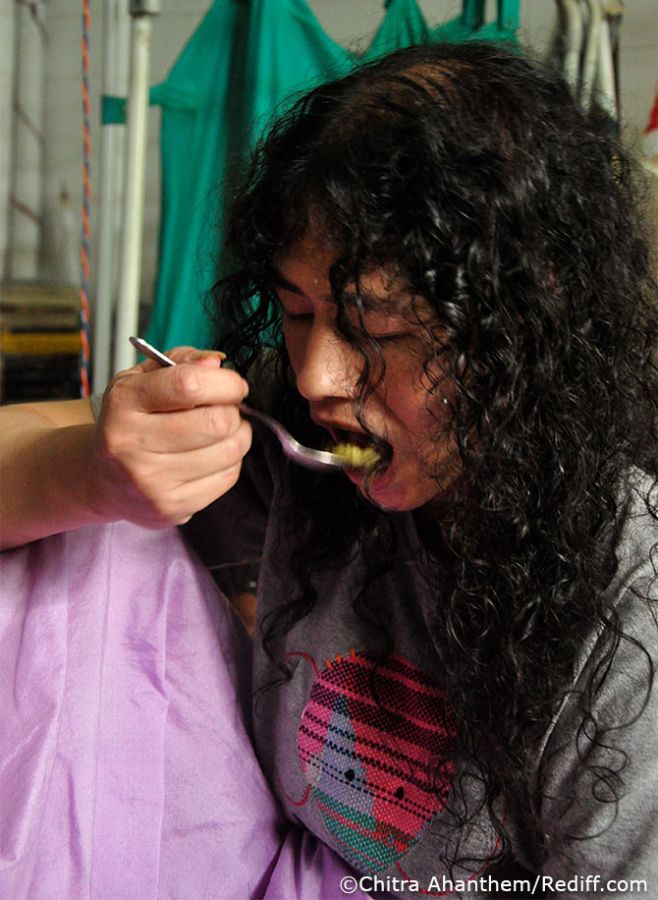
Sitting on a plastic chair in the room that was earlier her prison and is now her recuperating room, Sharmila says, "I have decided not to take up the offer of refuge by the Manipur chapter of the International Red Cross Society since it comes along with the condition that I cannot engage in any political activity as I have decided to stay on the path to my political future."
Asked what her reaction would be if she loses the election she is keen to contest, Sharmila says, "It will not be my defeat, but the defeat of the people. It will be the real litmus test."
For now though, the foremost concern for friends and well wishers gathered around Sharmila is to monitor her health and cheer every small change. The earlier diet of fortified liquids has now been expanded to include a semi-solid mix of rice and vegetables with minimal salt.
Asked about the fast announced by Arambam Robita and the opposition to it by various civil society groups, Sharmila smiles and says, "A few days ago, some of the groups wanted me to continue my fast and now a majority of civil society groups are against Robita. In the first year of my fast against the imposition of AFSPA, two married women had started a fast in support, but I was told to step in and tell the women that their children and families would suffer if they continued further. There can be a strong movement around AFSPA only when more and more people join a mass fast till its repeal."
What is now slowly coming to the fore is that Manipur's civil society groups need to strategise on how to keep their fight going against AFSPA and not confine themselves to react for or against people who are also in the same fight, but to look at common ground.

